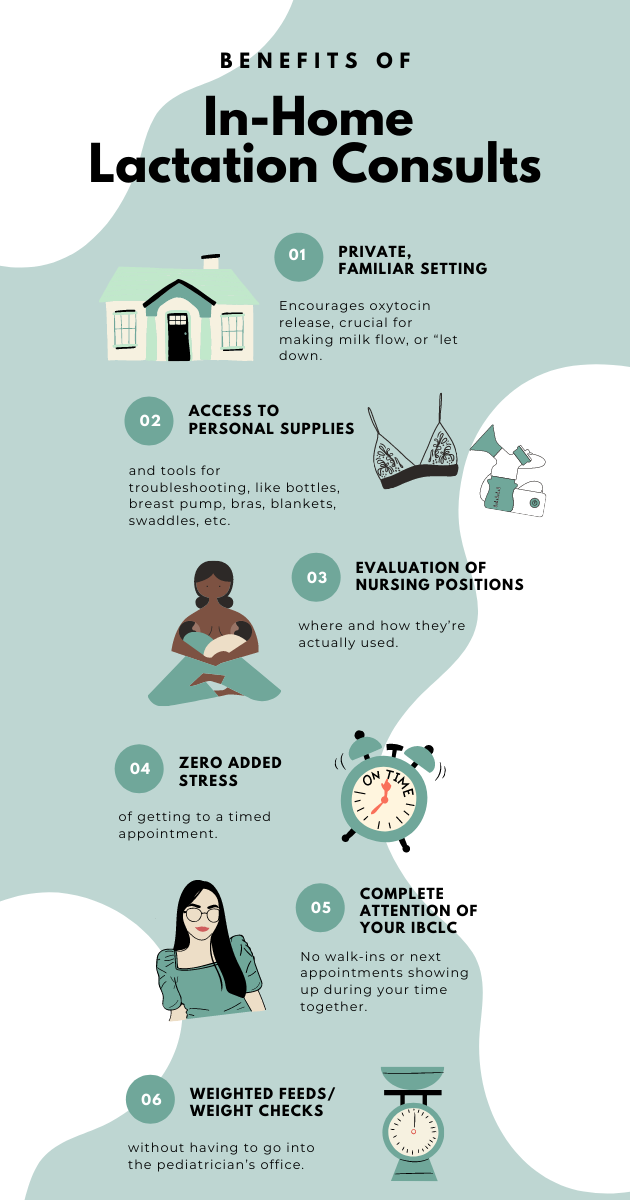In-Home Lactation Consultations: Why We Think They’re The Best
The lights in her office were so, so bright. I remember sitting in the chair reminiscent of my OB’s waiting room, holding my four-week-old baby (who I'd just discovered was only 8 pounds… her birth weight), watching her rummage through cabinets looking for anything to catch some breast milk.
“You didn’t bring any milk?!” She’d asked incredulously, just a moment before.
I was stunned… It hadn’t occurred to me to do so, even though we’d been supplementing with expressed milk for weeks now. My breasts were bare, and dry. No leaking. We had just tried to latch, again...unsuccessfully.
She finally found an old, used, lidless Medela bottle and, without rinsing, held it to my breast and began to hand express milk for my Maggie. I thought about protesting, but sitting, un-showered, in my milk-stained bra, under the harsh lights of her office, I felt dirtier than that bottle anyway. What would be the difference?
God, it was hot in there. Tears began to fall. I listened to the next client and her fussing baby through the paper thin walls. I knew my lactation consultant needed to get to them.
She pulled out a syringe and a tube and sucked up my milk, what little there was. She fed my baby what I’d produced and instructed me to feed her the milk I had stashed in the freezer at home. She quickly tapped away on her computer, telling me to let my pediatrician know that we had a care plan in place. I was headed to his office next, and we both knew he’d be alarmed at Maggie's (lack of) weight gain. And then, I packed up these new-to-me, previously-discarded supplies, myself, and my baby. And left.
I’ve been a mom for 8.5 years now… breastfeeding for 6.5 (and counting) of those. Never have I felt worse about myself as a parent than I did in that office with Maggie all those years ago. This is not an indictment of my lactation consultant at the time. She was great. But her knowledge + an in-home lactation consult would have made a world of difference to us.
We know breastfeeding doesn’t always feel intuitive.
We also know that it isn’t likely to in a clinical setting.
So why are so many tired and struggling new parents heading into office buildings or hospitals for help with their breastfeeding concerns? Leaving the house for an appointment on time with a newborn is harrowing enough in itself. Timing a car trip with a hungry baby’s next feed adds unnecessary stress for all involved.
JoEllen Noble, our resident International Board Certified Lactation Consultant, says, "It’s ideal to help clients in the same space they will be regularly nursing their babies- their chair, their pillows, their bed. A client should be able to rest and be comfortable at home instead of packing up their newborn- and any tools such as a breast pump- and driving to a whole new environment.”
The benefits of in-home lactation consults as opposed to consults in more clinical settings, like an office or hospital, are obvious….
Imagine being one week postpartum, still wearing a diaper (why wouldn’t you? They’re way more comfortable than a heavy pad with far less risk of leaking… I’ll die on this hill), still sore, protecting your bottom or abdomen as you sit, now with full, uncomfortable breasts, your nipples are sore, maybe even cracked or bleeding… and… getting topless in a waiting room-like chair, under bright lights to latch your baby to the breast? Okay, sure, if that’s the only option. But I’d wager most folks would prefer to do skin-to-skin at home, where they’re comfortable.
Oxytocin, or as many affectionately know it, “the love hormone,” is responsible for stimulating the milk ejection reflex, or “let down” during breastfeeding. Meaning… oxytocin is the reason milk flows out of your breasts. Oxytocin production is at it’s highest when you’re feeling the most calm, comfortable, and relaxed. For most people, that’s at home (definitely not when you’re racing to get out of the door with a newborn and marriage intact).
At home, you also have access to all of your own supplies for breastfeeding/bottle-feeding. Not sure how to use your breast pump? It makes sense to schedule a consult where you’ll be able to practice under the watchful eye of your IBCLC. Struggling to keep baby’s hands out of the way of a good latch? At home, your IBCLC can grab your favorite swaddle and show you how to wrap baby in a way that won’t impede a deep latch.
Maybe you’re anxious to try latching in side-lying position… but haven’t figured out a way to do it without your baby rolling up against your body and worrying you to death? Let’s get in the bed and practice. Getting a great latch in a stiff-backed chair, but not so much in the recliner in baby’s room? Let’s add a pillow here. These sorts of adjustments are not possible in someone else’s space.
"Sometimes we need to get a better idea of how much a baby is taking in at the breast and a weighted feed can help” says JoEllen, who brings a lactation scale with her to each consult. “In those cases a neonatal/lactation scale is best for precise measurements. Basic baby scales available for consumer purchase are designed for general weight checks and are not sensitive enough to pick up on small volumes of milk transfer.”
While not every new parent is suffering from severe postpartum depression like I was, and not every breastfed newborn is struggling to put on weight like my Maggie was, every breastfeeding dyad benefits from expert lactation support in the privacy and comfort of their own home. Book a consult with JoEllen today.

